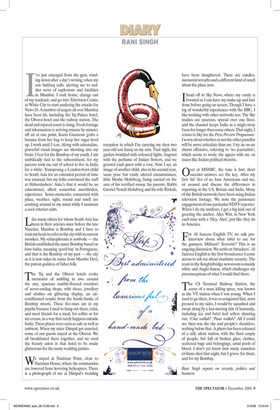I ’ve just emerged from the gym, winding down after a
day’s writing, when my son Sukhraj calls, alerting me to sudden news of explosions and fatalities in Mumbai. I rush home, change out of my tracksuit, and go into Television Centre at White City to start analysing the attacks for News 24. A number of targets all over Mumbai have been hit, including the Taj Palace hotel, the Oberoi hotel and the railway station. The dead and injured count is rising. Fresh footage and information is arriving minute by minute; off air at one point, Karin Giannone grabs a banana from her bag to keep her sugar level up. I work until 5 a.m. Along with adrenaline, powerful visual images are shooting into my brain. I fear for the Bombay of my youth. I am umbilically tied to the subcontinent, for my parents took me out of school to live in India for a while. Transposing a London-born child to South Asia for an extended period of time was unusual; but my folks convinced the staff at Haberdashers’ Aske’s that it would be an educational, albeit somewhat unorthodox, experience. Sense-memories connected with place, weather, sight, sound and smell are crashing around in my mind while I maintain a cool exterior calm.
Like many others for whom South Asia has been in their arteries since before the late Nineties, Mumbai is Bombay and I have to train my brain to refer to the city with its current moniker. My schizophrenia is symbolic — the British established the name Bombay based on bom bahia, meaning ‘good bay’ in Portuguese, and that is the Bombay of my past — the city as it is now takes its name from Mumba Devi, the patron goddess of fisher folk.
The Taj and the Oberoi hotels evoke memories of ambling in awe around the airy, spacious marble-floored corridors of never-ending shops, with shoes, jewellery and clothes on glittering display, an airconditioned respite from the hustle-bustle of Bombay streets. These five-stars are in my psyche because I used to hang out there, relax, and meet friends for a meal, for coffee or for ice-cream, in a way that rarely happens outside India. These places were seen as safe as well as ambient. When my sister Dimpal got married, some of our guests stayed at the Oberoi. We all breakfasted there together, and we used the beauty salon in that hotel to be made glamorous for the many wedding parties.
We stayed at Nariman Point, close to Nariman House, where the commandos are lowered from hovering helicopters. There is a photograph of me at Dimpal’s wedding reception in which I’m carrying my then two year-old son Jairaj on my arm. That night, the garden twinkled with coloured lights, fragrant with the perfume of Indian flowers, and we greeted each guest with a rose. Now I see an image of another child, also in his second year, same pose but vastly altered circumstances; little Moshe Holtzberg, being carried on the arm of his terrified nanny; his parents, Rabbi Gavriel Noach Holtzberg and his wife Rivkah, have been slaughtered. There are candles, memorial wreaths and a different kind of smell about the place now.
Ihead off to Sky News, where my vanity is boosted as I can have my make-up and hair done before going on screen. Though I have a log of wonderful experiences with the BBC, I like working with other networks too. The Sky studios are spacious, spread over one floor, and the channel keeps India as a single-story focus for longer than some others. That night, I return to Sky for the Press Preview Programme. I worry about whether or not the other panellist will be more articulate than me. I try an on-air charm offensive, referring to ‘we journalists’, which seems to work; she agrees with me on issues like Indian political rhetoric.
Over at MSNBC, the tone is fast; short succinct answers are the key. After my first ‘hit’ five of us, four Americans and me, sit around and discuss the differences in reporting in the US, Britain and India. Many of the British networks have been using Indian television footage. We note the passionate engagement of one particular NDTV reporter. When I do my analyses, I get a big kick out of greeting the anchor, Alex Witt, in New York each time with a ‘Hey, Alex’, just like they do in America.
For Al Jazeera English TV, we talk preinterview about what label to use for the gunmen. Militant? Terrorist? This is an ongoing discussion. We settle on ‘Attackers’. Al Jazeera English is the first broadcaster I come across to ask me about maritime security. The team in the Knightsbridge newsroom is mainly white and Anglo-Saxon, which challenges my preconceptions of what I would find there.
The CS Terminal Railway Station, the scene of a mass killing spree, was known as the VT station when I was young. When I used to go there, it was so congested that, arms pressed to my sides, I would be squashed and swept along by a fast-moving tide of humanity, including tea and betel leaf sellers shouting out, ‘Chai wallah!’ ‘Paan wallah!’ All I could see then was the sky and people’s shoulders, nothing below that. A photo has been released of a still, silent station, with the floor empty of people, but full of broken glass, clothes, scattered bags and belongings, amid pools of blood. I don’t yet know how many nameless civilians died that night, but I grieve for them, and for my Bombay.
Rani Singh reports on security, politics and business.


















































































 Previous page
Previous page